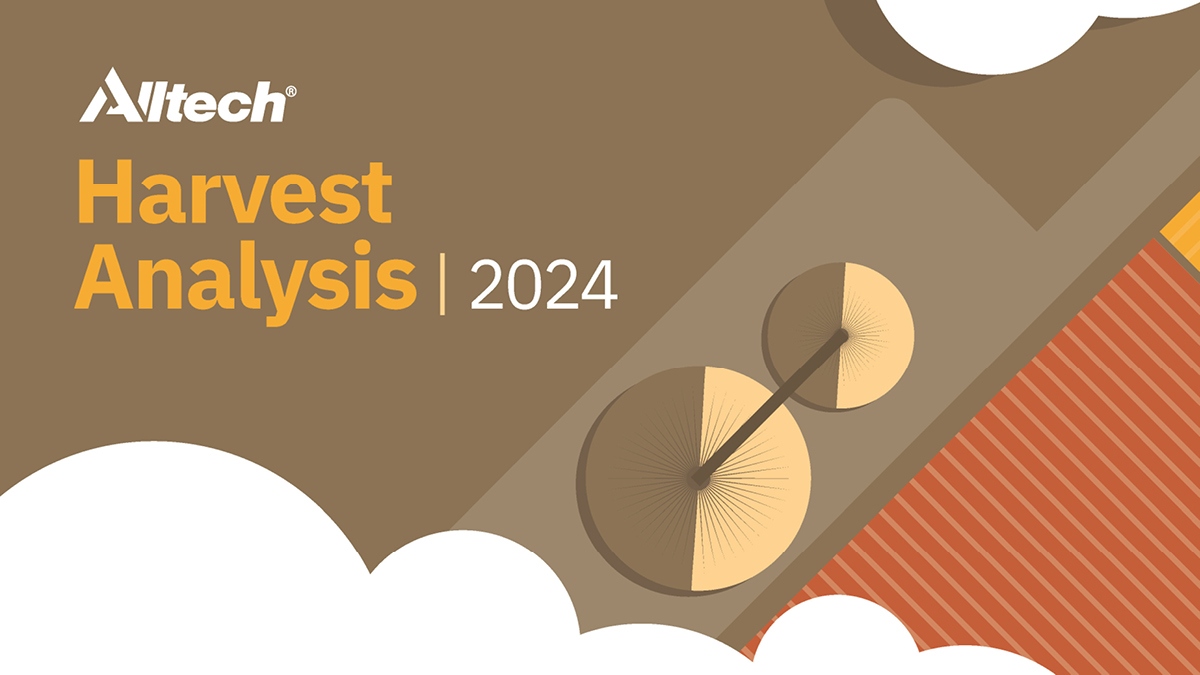[STAMFORD, UK] – Alltech, a global leader in biotechnology, has released the complete Alltech 2024 European Harvest Analysis report. The comprehensive final report shows that a combination of heavy early-season rains and late-season droughts has created distinct challenges for crop producers in Central and Southeastern Europe and indicates that overall risk is moderate to high.
“Overall, European grains may have similar or higher risk this year compared to last year. Type B trichothecenes are predominant mycotoxins in corn silage and straw, while the other Penicillium mycotoxins dominate grass silages,” said Dr. Radka Borutova, global technical support for the Technology Group at Alltech. “Together, these mycotoxins could impact animal performance and health, so producers should be aware of these challenges in order to be proactive in their mycotoxin management strategies.”
The final mycotoxin risk will ultimately depend on the animal species and groups being fed and the mycotoxin concentrations and combinations in the finished diet.
Mycotoxins, which are natural substances produced by moulds and fungi, are more prevalent — and more of a problem in agriculture — than ever before. More than 95% of crops today are contaminated with at least one mycotoxin, and usually with two or more. Because these toxins are difficult to detect, they can cause significant damage to animal health before producers even realize they are present. A proactive mycotoxin management programme is essential, and the first step is learning which mycotoxins pose the highest risk in specific regions, crops and species.
The Alltech 2024 European Harvest Analysis programme tests samples of new-crop grains and forages collected from farms or animal feed production sites in 20 countries, ensuring an accurate picture of mycotoxin contamination across the continent. All samples are tested at the leading-edge Alltech 37+® lab, which can detect the presence of 54 mycotoxins. Corn samples from central and southern Europe are also tested in collaboration with SGS, a global leader in mycotoxin testing and certification.
Other key results from the Alltech 2024 European Harvest Analysis include:
Barley
Samples tested show an average of 6.8 mycotoxins per sample, with 98% containing multiple mycotoxins. The highest-risk mycotoxins are type B trichothecenes, type A trichothecenes and ergot alkaloids.
Wheat
Samples show an average of 7.6 mycotoxins per sample, with 99% containing multiple mycotoxins. The most prevalent mycotoxins are type B and type A trichothecenes.
Forages
Forage samples (grass silage, corn silage and straw) show 3.7 mycotoxins per sample on average, with 78% of samples containing multiple mycotoxins. The most prevalent are type B trichothecenes and Penicillium mycotoxins such as penicillic acid, mycophenolic acid and patulin.
On Nov. 21, Alltech hosted “From Field to Feed: 2024 Crop and Mycotoxin Analysis”, a broadcast streamed live from Alltech’s headquarters in Lexington, Kentucky, U.S. During the broadcast, panellists shared valuable insights for managing risks across the supply chain. Here are the key takeaways:
-
Test and monitor: Regularly test crops and feed to understand what’s present and to ensure high quality.
-
Leverage weather data: Pay attention to weather patterns and farm-specific conditions to assess potential risks early.
-
Use comprehensive information: Gather unbiased data from all aspects of your operation and tailor it to fit your specific needs.
-
Combine methods: Utilise both traditional techniques and new technologies to refine processes and ensure feed quality.
-
Act proactively: If mycotoxins are present, be proactive with management to ensure high-quality feed production, thus protecting animals and safeguarding your operation’s resilience and success.
Register online at alltech.com/harvest-analysis to gain access to the recording of the broadcast as well as the full 2024 Alltech Harvest Analysis programme, including the complete European report, which is available now.
For more information about Alltech mycotoxin management solutions, visit knowmycotoxins.com.















